The U.S. Coast Guard is “seriously underfunded” and lacks the heavy icebreaker fleet that Russia and possibly China might deploy to dominate polar sea lanes, Democratic Congressman from California John Garamendi told the U.S. state’s maritime executives, according to the American Journal of Transportation.
The Coast Guard has only one heavy ice-breaker that is currently in drydock for repairs and is over forty years old, the congressman said. In comparison, Russia has 45 operational icebreakers, while China has one but has an ambitious building programme that has raised concerns in Washington.
Garamendi is a senior Democrat on the House sub-committee for the U.S. Coast Guard and Merchant Marine. He spoke at a Maritime Stakeholder meeting that took place at the California Maritime Academy at Vallejo, California.
For Russia, the Northern Sea Route is most importantly a slowly thawing shortcut for its Liquefied Natural Gas (LNG) exports to East Asia, especially China. The ships carrying LNG previously required an icebreaker escort, but the newest designs can actually break through ice on their own.
Russia owns the world’s largest icebreakers with the 25,000-ton nuclear-powered Arktika-class, which can power through nine feet of ice. The first of these was launched in 2016, now two are afloat with a third under construction. But even Arktika will be dwarfed by its in-development successor, a nuclear-powered monster called Project 10510, or “Lider-class,” which is nearly twice as powerful.
Plans for these giants have been around since the early 2000s, but 15 years later, these ideas are becoming reality. Russia’s Industry and Trade Minister Denis Manturov has announced last year that three Lider-class icebreakers will be built by 2024-25.
American navy commanders have repeatedly criticized the lack of any clear strategy from the Pentagon for the region, especially because ice-melting conditions have recently begun opening up opportunities for merchant shipping lanes.
James Mattis, the U.S. defense secretary, declared in a national defense strategy document in January that the Pentagon’s top priority was to prepare for a “great power competition” from Russia and China. However, officials warned that in the Arctic the military was lagging behind the two rivals.












